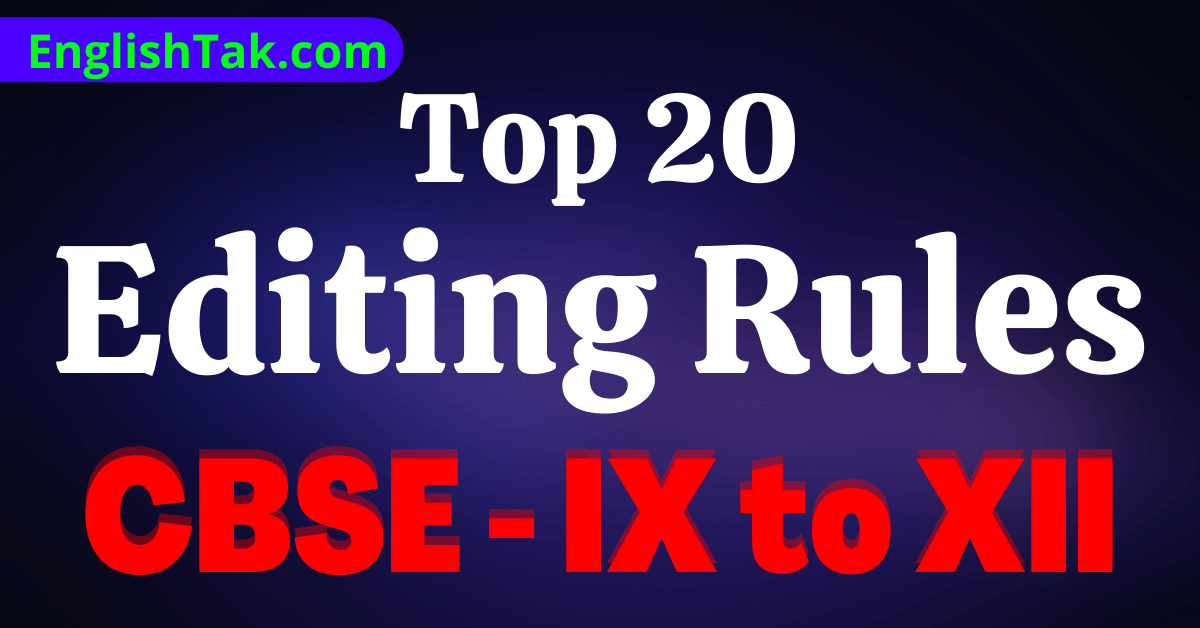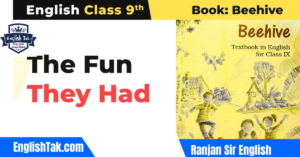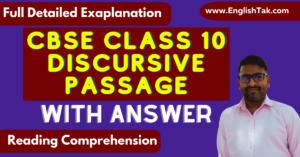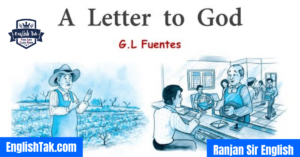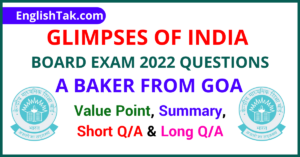![]()
Top 20 English Editing Rules – (IXth to XIIth)
Hello students, In this post (Top 20 English Editing Rules), I am going to give you top twenty rules of Editing. As you know in the board exams of CBSE, it is always asked. There are minimum five questions based on this topic. I would like to suggest you all to go through this post and grab 5 marks in English without a doubt.
Let’s start…
Rule – 1. Generally base form of verb (MV1) is used after ‘To’. In this case, ‘To’ is considered to be the infinitive particle. But when it is considered to be a preposition, it takes the ‘ING‘ form of verb. If it is a verb, it generally comes with verb to be (am/is/are/was/were).
Look at the below examples to understand it better.
Ex. I want to talked to you. (✘)
I want to talk to you. (✓)
He is addicted to drink. (✘)
He is addicted to drinking. (✓)
She comes here to learned English grammar. (✘)
She comes here to learn English. (✓)
Rules- 2. As I have mentioned in the Rule number, it is clear that after a preposition, only ‘ING’ verb form is used.
Look at the below examples to understand it better.
After enter the classroom, I greet my friends. (✘)
After entering the classroom, I greet my friends. (✓)
She came here before do her work yesterday. (✘)
She came here before doing her work yesterday. (✓)
Rules- 3. Only the base form of verb (MV1) is used after the helping verb ‘Do/Does/Did’; As you know these verbs are used in simple or indefinite tense of present and past.
Look at the below examples to understand it better.
As I know, they did helped the poor. (✘)
As I know, they did help the poor. (✓)
She does not sings a song. (✘)
She does not sing a song. (✓)
You don’t does your homework on time. (✘)
You don’t do your homework on time. (✓)
Rules- 4. After the helping verb ‘Has/Have/Had’, we can use various types of verb, Look at structures below to get it better.
Have/Has/Had + Noun
Have/Has/Had + MV3 (Gone/written/been)
She has a book of English. (✓)
They have win the match. (✘)
They have won the match. (✓)
We had an expensive car. (✓)
Rohan has been advised to study hard. (✓)
Rules- 4. As you know there is a section in the Preposition chapter called ‘Fixed Preposition‘ Just memorize some of the important fixed preposition expected to be asked in the Board Exams.
There is no preposition used with ‘Tell, know, marry etc.’ but in the passive voice they take preposition ‘To’.
Look at the List
| Sr. No. | WORD | PREPOSITION | Sr. No. | WORD | PREPOSITION |
| 1 | ABIDE | BY | 167 | GLANCE | AT |
| 2 | ABSENT | FROM | 168 | GRATEFUL | TO |
| 3 | ABSTAIN | FROM | 169 | GUILTY | OF |
| 4 | ABILITY | TO | 170 | GREEDY | OF |
| 5 | ACCEPTABLE | TO | 171 | GAZE | AT |
| 6 | ACCESS | TO | 172 | GUARD | AGAINST |
| 7 | ACCOUNT | FOR | 173 | HANKER | AFTER (FOLLOW) |
| 8 | ACCUSE | OF | 174 | HAPPEN | TO |
| 9 | ACCUSTOMED | TO | 175 | HOPE | FOR |
| 10 | ACQUAINTED | WITH | 176 | HOPEFUL | TO |
| 11 | ACQUIT | OF | 177 | HONEST | IN |
| 12 | ACT | UPON | 178 | HARMFUL | TO |
| 13 | ADAPT | TO | 179 | HIDE | FROM |
| 14 | ADD | TO | 180 | HAND | OVER |
| 15 | ADDICTED | TO | 181 | HEIR | TO |
| 16 | ADJACENT | TO | 182 | HATRED | FOR |
| 17 | ADMIT | TO | 183 | HINDER | FROM (STOP) |
| 18 | ADVANTAGE | OF | 184 | IGNORANT | OF |
| 19 | AFRAID | OF | 185 | IMPRESS | WITH |
| 20 | AFFECTED | BY | 186 | INDEBTED | TO |
| 21 | AFFECTION | FOR | 187 | INDULGE | IN |
| 22 | AGREE | WITH (Person) | 188 | INDIFFERENT | TO |
| 23 | AGREE | TO (Thing) | 189 | INFERIOR | TO |
| 24 | AIM | AT | 190 | INVOLVED | IN |
| 25 | ALARMED | AT | 191 | INVITE | TO |
| 26 | ALIGHT | FROM | 192 | INSIST | ON |
| 27 | ALIVE | TO | 193 | INJURIOUS | TO |
| 28 | AMUSED | WITH | 194 | INTEREST | IN |
| 29 | AMAZED | AT | 195 | INQUIRE | INTO |
| 30 | ANGRY | WITH (PERSON) | 196 | INSPIRE | WITH |
| 31 | ANGRY | AT (STH.) | 197 | INVEST | IN |
| 32 | ANNOYED | WITH (PERSON) | 198 | IMPORT | FROM |
| 33 | ANNOYED | AT (STH.) | 199 | IMPOSE | UPON |
| 34 | ANSWER | FOR | 200 | JUNIOR | TO |
| 35 | ANXIOUS | ABOUT | 201 | JOIN | TO |
| 36 | APOLOGISE | TO | 202 | JOIN | WITH |
| 37 | APOLOGISE | FOR (STH.) | 203 | KEEP | TO |
| 38 | APPEAL | TO | 204 | KEEN | ON |
| 39 | APPETITE | FOR | 205 | KEY | TO |
| 40 | APPLICABLE | TO | 206 | KIND | TO |
| 41 | APPLY | FOR | 207 | KNOCK | AT |
| 42 | APPOINTED | TO (POST) | 208 | KNOCK | DOWN |
| 43 | APPROVE | OF | 209 | KNOCK | AGAINST |
| 44 | APTITUDE | FOR | 210 | LAUGH | AT |
| 45 | ASK (DEMAND) | FOR | 211 | LEAD | TO |
| 46 | ASHAMED | OF | 212 | LOYAL | TO |
| 47 | ASSOCIATED | WITH | 213 | LEAN | AGAINST |
| 48 | ASTONISHED | AT | 214 | LONG | FOR |
| 49 | ASSURE | OF | 215 | LOOK | AT |
| 50 | ATTEND | TO | 216 | LUST | FOR |
| 51 | AVAIL | OF | 217 | MARRY | TO |
| 52 | AWARE | OF | 218 | MATCH | FOR |
| 53 | BARK | AT | 219 | MEET | WITH (Accident) |
| 54 | BEG | FOR | 220 | MAKE FUN | OF |
| 55 | BELIEVE | IN | 221 | NECESSARY | FOR |
| 56 | BELONG | TO | 222 | NEGLIGENT | IN |
| 57 | BENT | ON/UPON | 223 | NEED | OF |
| 58 | BEWARE | OF | 224 | NOTORIOUS | FOR |
| 59 | BLESS | WITH | 225 | NOMINATE | FOR |
| 60 | BACK | OUT | 226 | OBEDIENT | TO |
| 61 | BLIND | OF (EYE) | 227 | OBJECT | TO |
| 62 | BLIND | TO (WORK) | 228 | OPEN | TO |
| 63 | BOAST | OF | 229 | OBLIGED | TO |
| 64 | BORN | OF(PARENTS) | 230 | OVERWHELMED | WITH |
| 65 | BUSY | WITH | 231 | OCCUPIED | IN |
| 66 | BORROW | FROM | 232 | OFFEND | WITH |
| 67 | BREAK | INTO( STEAL) | 233 | OPPURTUNITY | FOR |
| 68 | BREAK | OUT (SPREAD) | 234 | OPPOSITE | TO |
| 69 | BENEFICIAL | TO | 235 | PART | WITH |
| 70 | BASED | ON | 236 | POPULAR | WITH |
| 71 | BURST | INTO | 237 | PREFER | TO |
| 72 | CARE | FOR (PERSON) | 238 | PREPARE | FOR |
| 73 | CARE | OF (STH.) | 239 | PRESIDE | OVER |
| 74 | CAPABLE | OF | 240 | PROUD | OF |
| 75 | CALL | ON | 241 | PROVIDE | WITH |
| 76 | CALL | IN (INVITE) | 242 | PROTECT | FROM |
| 77 | CANDIDATE | FOR | 243 | PRIDE | IN |
| 78 | CERTAIN | OF | 244 | PRAY | TO |
| 79 | CHARGE | WITH | 245 | PREVENT | FROM |
| 80 | CHEAT | OF | 246 | PROFIT | BY |
| 81 | CLAIM | ON | 247 | PITY | ON |
| 82 | CLASH | WITH | 248 | PARALLEL | TO |
| 83 | CLOSE | TO | 249 | PARTIAL | TO |
| 84 | CLING | TO | 250 | PAY | FOR |
| 85 | COMPLY | WITH (ACCEPT) | 251 | PLEASE | WITH |
| 86 | COMMENCE | ON | 252 | PRETEND | TO |
| 87 | COMPARE | WITH (PERSON) | 253 | PARTICIPATE | IN |
| 88 | COMPARE | TO (THING) | 254 | PASSION | FOR |
| 89 | COMPENSATE | FOR | 255 | PROTEST | AGAINT |
| 90 | COMPLAIN | AGAINST/OF | 256 | PROVOKE | TO |
| 91 | CONFIDENCE | IN | 257 | PROCEED | TO |
| 92 | CONGRATULATE | ON | 258 | PONDER | OVER (THINK) |
| 93 | CONSIST | OF | 259 | PROHIBIT | FROM |
| 94 | CONTENT | WITH | 260 | PLUNGE | INTO (DIVE) |
| 95 | CONTRARY | TO (OPPOSITE) | 261 | QUARREL | WITH |
| 96 | CONTROL | OVER | 262 | QUICK | AT |
| 97 | COUNT | ON | 263 | QUALIFY | FOR |
| 98 | CURE | OF (ILLNESS) | 264 | QUARREL | OVER |
| 99 | COLLIDE | WITH | 265 | RECOVER | FROM |
| 100 | CONVICT | OF (ACCUSE) | 266 | RECOMMEND | TO/FOR |
| 101 | CONCEAL | FROM | 267 | RELATED | TO |
| 102 | CONFINE | TO (LIMITED) | 268 | REFER | TO |
| 103 | COMPETENT | FOR | 269 | REFRAIN | FROM |
| 104 | CONTACT | WITH | 270 | REGARD | FOR |
| 105 | COMPETITION | FOR | 271 | REJOICE | AT |
| 106 | DEAF | TO | 272 | RELY | ON |
| 107 | DEAL | IN (Business) | 273 | RESPECT | FOR |
| 108 | DEAL | WITH (PEOPLE) | 274 | RULE | OVER |
| 109 | DELIEVER | TO | 275 | REPENT | OF |
| 110 | DEMAND | FOR | 276 | REPLY | TO |
| 111 | DEPEND | ON | 277 | REMIND | OF |
| 112 | DEPRIVE | OF | 278 | REMEDY | FOR |
| 113 | DESIRE | FOR | 279 | RESULT | OF |
| 114 | DESIROUS | OF | 280 | REGRET | FOR |
| 115 | DESTINED | TO | 281 | SEARCH | FOR |
| 116 | DEVOID | OF (DEPRIVE ) | 282 | SEND | TO |
| 117 | DIE | OF | 283 | SEEK | FROM/FOR |
| 118 | DIFFER | WITH | 284 | SEND | FOR |
| 119 | DIFFERENT | FROM | 285 | SICK | OF |
| 120 | DISPLEASE | WITH | 286 | SIMILAR | TO |
| 121 | DISPOSE | OF | 287 | SORRY | FOR |
| 122 | DISTINGUISH | BETWEEN | 288 | STARE | AT |
| 123 | DOUBT | ABOUT | 289 | STICK | TO |
| 124 | DOWN | WITH | 290 | SURE | OF |
| 125 | DREAM | OF | 291 | SUCCEED | IN |
| 126 | DULL | OF | 292 | SUPERIOR | TO |
| 127 | DEVOTE | TO | 293 | SURPRISE | AT |
| 128 | DERIVE | FROM | 294 | SYMPATHY | FOR |
| 129 | DIFFERENT | FROM | 295 | SHOCKED | AT |
| 130 | DISGUSTED | WITH | 296 | SATISFIED | WITH |
| 131 | DUTY | TO | 297 | SHIVER | WITH |
| 132 | DEDICATE | TO | 298 | SACRED | TO |
| 133 | DISMISS | FROM | 299 | SAVE | FROM |
| 134 | DISQUALIFIED | FROM/FOR | 300 | SUFFICIENT | FOR |
| 135 | DUE | TO | 301 | SMILE | AT |
| 136 | EAGER | FOR | 302 | TASTE | FOR |
| 137 | ELIGIBLE | FOR | 303 | THANKFUL | TO |
| 138 | EMERGE | FROM | 304 | THROW | INTO/AT |
| 139 | ENGAGE | IN | 305 | TIRED | OF |
| 140 | ESCAPE | FROM | 306 | TRUST | IN |
| 141 | EXCEL | IN | 307 | TRUE | TO |
| 142 | EXCHANGE | FOR | 308 | TALK | ABOUT |
| 143 | ESSENTIAL | FOR | 309 | TALK | TO |
| 144 | ESSENTIAL | TO (WORK) | 310 | THINK | OVER |
| 145 | EXCEPTION | TO | 311 | TREMBLE | WITH |
| 146 | EXCUSE | FOR | 312 | TRIUMPH | OVER |
| 147 | EXPLAIN | TO | 313 | TAMPER | WITH |
| 148 | FAITH | IN | 314 | USED | TO |
| 149 | FAITHFUL | TO | 315 | USEFUL | FOR |
| 150 | FAMILIAR | TO | 316 | VOTE | FOR |
| 151 | FAMILIAR | WITH | 317 | VOTE | AGAINST |
| 152 | FAMOUS | FOR | 318 | VERSED | IN |
| 153 | FEEL | FOR | 319 | VICTIM | TO |
| 154 | FIGHT | WITH | 320 | WAIT | FOR |
| 155 | FIGHT | AGAINST | 321 | WARN | AGAINST |
| 156 | FIGHT | FOR | 322 | WISH | FOR |
| 157 | FILL | WITH | 323 | WORTHY | OF |
| 158 | FIT | FOR | 324 | WONDER | AT |
| 159 | FOND | OF | 325 | WEARY | OF |
| 160 | FORGIVE | FOR | 326 | WORK | AT |
| 161 | FREE | FROM | 327 | WITHDRAW | FROM |
| 162 | FREEDOM | OF | 328 | YEARN | FOR |
| 163 | GIFTED | WITH | 329 | YIELD | TO |
| 164 | GLAD | AT | 330 | ZEAL | FOR |
| 165 | GOOD | AT (WORK) | 331 | ZEALOUS | IN |
| 166 | GOOD | TO (PERSON) | 332 |
Rules- 5. Article A/An or Numeral Adjective ‘One’ must be used before a singular noun.
Ex. She is reading book. (✘)
She is reading a book. (✓)
He has eaten apple. (✘)
He has eaten an apple. (✓)
They had car when they were in Delhi. (✘)
They had one car when they were in Delhi. (✓)
Rule- 6. A noun must be in the plural form if it is used after ‘Two/three…. many, several, both’ etc.
Ex. I have two book. (✘)
I have two books. (✓)
She has may friend. (✘)
She has many friends. (✓)
Rule- 7. A singular noun and uncountable noun are used after ‘This/That’ but plural noun is used after ‘These/Those’. Remember one thing that uncountable noun is not used after ‘These/Those’.
This/That + Singular Countable Noun/Uncountable Noun
These/Those + Plural Countable Noun
This boys is my friend. (✘)
This boy is my friend. (✓)
These boys are my friends. (✓)
This water is sweet. (✓)
That idea was not good. (✓)
Rules-8. A plural countable noun is used after ‘Few, a few & the few’.
Few / A Few / The Few + Plural Countable Noun
Ex. There is few student in the class. (✘)
There is few students in the class. (✓)
She has read the few book that she borrowed from library. (✘)
She has read the few books that she borrowed from library. (✓)
I have a few book on English. (✘)
I have a few book on English. (✓)
Rule-9. A singular uncountable noun is always used with ‘Little, A little & The little’.
Little / A Little / The Little + Uncountable Noun
Ex. She has little knowledges of English. (✘)
She has little knowledge of English. (✓)
Rohan has sold the little milk he had. (✓)
Rule-10. A base form of verb is always used with a modal auxiliary verb like – can, could, may …. etc.
Modal Verb + MV1
Ex. She could went there in the night. (✘)
She could go there in the night. (✓)
She will singing a song in the concerts. (✘)
She will sing a song in the concerts. (✓)
Top 20 English Editing Rules
Suggested For You | |
| Grammar | EnglishTak YouTube Channel |
| Spoken English | Videos |
| Ranjan Sir Blog | Join Our WhatsApp Group |
Rule- 11. But Past participle (MV3) is used after ‘Modal + Have’
Modal Verb + Have + MV3
She will have complete her work. (✘)
She will have completed her work. (✓)
You may have hear the name of Mountain man. (✘)
You may have heard the name of Mountain man. (✓)
Rule- 12. Only ‘Were/V2‘ is used after ‘I wish/As if/As though/’ etc.
If only / I wish / As if / As though + Sub + were / V2 + object / other words
Ex. I wish she was my friend. (✘)
I wish she were my friend. (✓)
She talks to me as if she was my wife. (✘)
She talks to me as if she were my wife. (✓)
If only I go there the day before yesterday. (✘)
If only I went there the day before yesterday. (✓)
Top 20 English Editing Rules
Watch the Video for Rule No. 1-13
Top 20 English Editing Rules
Rule- 13. The verb used after dummy or introductory ‘There’ must agree with the noun coming after it. If the noun is singular, a singular verb is used and if the noun is plural a plural verb is used.

Ex. There is two boys in the classroom. (✘)
There are two boys in the classroom. (✓)
There are nothing in box. (✘)
There is nothing in box. (✓)
There was many people in the train. (✘)
There were many people in the train. (✓)
Rule- 14. A singular verb is always used after indefinite pronouns ‘Somebody, someone, something, no one, nobody, nothing, anyone, anybody, anything,’.
Ex. Something were not done there. (✘)
Something was not done there. (✓)
Anybody are going to beat you now. (✘)
Anybody is going to beat you now. (✓)
No body have done the homework. (✘)
No body has done the homework. (✓)
Rule- 15. A present participle (MV1+ing) or a past participle (MV3) is used after ‘Be’ Verb. The present participle is used in the Active Voice and the Past participle is used in the Passive Voice
Be Verbs = Am / Is / Are / Was / Were / Be / Been
Am / Is / Are / Was / Were / Be / Been + MV1 + Ing (Active Voice)
Am / Is / Are / Was / Were / Be / Been + MV3 (Passive Voice)
Ex. She is read the book. (✘)
She is reading a book. (✓)
He is beating there. (✘)
He is being beaten there. (✓)
She will be go to school tomorrow. (✘)
She will be going to school tomorrow. (✓)
Rule- 16. Continuous Tense is used with ‘While’ and Indefinite and continuous tense is used after ‘When’.
While + Continuous Tense (Generally Past)
When + Indefinite & Continuous Tense (Generally Past)
Ex. She met with an accident while she went to school. (✘)
She met with an accident while she was going to school. (✓)
When I went to him, he was reading novel. (✓)
I saw her when / while I was going to market. (✓)
Rule- 17. Duration of Time is used with preposition ‘For’ but Point of Time is used with preposition ‘Since’.
Note:- Questions asked often asked in the use of Preposition.
| For | Since |
| Duration of Time | Point of Time |
| All Tenses | Perfect & Perfect Continuous |
| for 15 minutes | since 11 AM |
| for five days | since Tuesday |
| for nine months | since January |
| for 5 years | since 1999 |
| for 3 centuries | since 1600 |
| for a long time | since I left school |
| for ever | since the beginning of time |
| for years | since marriage |
| for months | since childhood |
Ex. She has been learning English grammar since six years. (✘)
She has been learning English grammar for six years. (✓)
They have been here for two o’clock. (✘)
They have been here since two o’clock. (✓)
Rule- 18. After comparative degree ‘Than’ is used not ‘Then’. And remember one thing in this case article ‘The’ is not used before comparative degree.
![]()
Ex. She is the better then Radha is. (✘)
She is better than Radha is. (✓)
Note- But when preposition ‘Of’ is used instead of ‘Than’, article ‘The’ must be used before comparative degree.
Ex. She is better of the two girls. (✘)
She is the better of the two girls. (✓)
Rule- 19. If a noun is used with possessive determiner, the verb agrees with the noun not the determiner.
Ex. My friends is coming here to talk to me.
My friends are coming here to talk to me.
Rule- 20. Use of relative pronoun is very important; ‘Who’ is used for person and ‘Which’ is used for ‘Thing’.
Ex. I know a man which is very rich.
I know a man who is very rich.
Top 20 English Editing Rules
Watch the Video for Rule No. 14-20
Top 20 English Editing Rules
Thank You All & Please Share this post among your friends.
